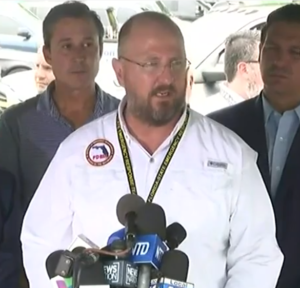Plus, a new hurricane warning
 Governor DeSantis’ warning about Citizens Property Insurance, details on the next rate increase facing some Florida policyholders, how excess litigation is driving higher automobile insurance rates, plus what Florida disaster management officials will be doing differently in the next hurricane. It’s all in this week’s Property Insurance News.
Governor DeSantis’ warning about Citizens Property Insurance, details on the next rate increase facing some Florida policyholders, how excess litigation is driving higher automobile insurance rates, plus what Florida disaster management officials will be doing differently in the next hurricane. It’s all in this week’s Property Insurance News.
 Governor’s Warning: Governor DeSantis commented last week during an interview with CNBC that the Florida taxpayer-backed Citizens Property Insurance Corporation is “not solvent” and there’s been much chatter about that comment. LMA gets what the Governor is saying in that he is expressing the need to shrink Citizens, period. While there’s a long established procedure in place through graduated assessments for paying all Citizens claims, no matter the worst-case scenario, that puts even non-Citizens customers on the hook if future claims wipe out its reserves and surplus. Using the insolvency word is scary but what is scarier is that if a storm hits our state that is of the size of the 1926 Miami Hurricane, all bets are off. Our entire state will be in trouble and our concerns should be even greater than Citizens.
Governor’s Warning: Governor DeSantis commented last week during an interview with CNBC that the Florida taxpayer-backed Citizens Property Insurance Corporation is “not solvent” and there’s been much chatter about that comment. LMA gets what the Governor is saying in that he is expressing the need to shrink Citizens, period. While there’s a long established procedure in place through graduated assessments for paying all Citizens claims, no matter the worst-case scenario, that puts even non-Citizens customers on the hook if future claims wipe out its reserves and surplus. Using the insolvency word is scary but what is scarier is that if a storm hits our state that is of the size of the 1926 Miami Hurricane, all bets are off. Our entire state will be in trouble and our concerns should be even greater than Citizens.
How do we combat this? How do we stare this real scenario in its face? Stop building on barrier islands and in places that the risk of loss is the greatest. Encourage homeowners to maintain their homes by replacing their roofs and strengthening their windows and garage doors. And most importantly, allow Citizens to charge the “right” rates that should be higher than the rest of the admitted market as a long- term solution. We will keep talking about this and having these tough conversations. It makes no sense to keep growing Citizens and the Governor is right to talk frankly about its financial situation.
 Next Rate Increase: While Citizens’ rates are legislatively-capped and thus under-market (and actuarially-unsound), the rest of the insurance market’s companies are legally prohibited from charging rates that are inadequate. We do our best to cover the hearings when carriers seek the rate they need to comply with Florida rating law. We reported the Amica Mutual and Castle Key insurance companies recently and American Traditions Insurance Company will be the third carrier to go before regulators this year at a public rate hearing this Thursday (March 7) at 10am. he company is seeking a statewide average rate increase of 24.6% for its Mobile Home Multi-Peril policies for new and renewal business effective August 1, 2023 and a 26.3% increase for its Mobile Home Physical Damage policies for new and renewal business effective November 20, 2023, both under Use and File submission. It has a total of just over 74,000 mobile home policies in Florida.
Next Rate Increase: While Citizens’ rates are legislatively-capped and thus under-market (and actuarially-unsound), the rest of the insurance market’s companies are legally prohibited from charging rates that are inadequate. We do our best to cover the hearings when carriers seek the rate they need to comply with Florida rating law. We reported the Amica Mutual and Castle Key insurance companies recently and American Traditions Insurance Company will be the third carrier to go before regulators this year at a public rate hearing this Thursday (March 7) at 10am. he company is seeking a statewide average rate increase of 24.6% for its Mobile Home Multi-Peril policies for new and renewal business effective August 1, 2023 and a 26.3% increase for its Mobile Home Physical Damage policies for new and renewal business effective November 20, 2023, both under Use and File submission. It has a total of just over 74,000 mobile home policies in Florida.
 Litigation-Driven Rates: A new report by the Insurance Information Institute details how excessive litigation is compounding a years-long problem of rising auto insurance costs. Legal System Abuse – State of the Risk acknowledges that dangerous roads and driving conditions as well as economic costs have been on the rise for several years. But those challenges are now greatly exasperated by “overzealous billboard attorneys,” as insurance carriers last year on average paid out more than $1.10 for every $1 in premium they collected, per Triple-I. The report examines the tactics used to initiate more lawsuits, to drive up a defendant’s litigation expenses and settlement payouts, and to secure outsized monetary awards after jury verdicts.
Litigation-Driven Rates: A new report by the Insurance Information Institute details how excessive litigation is compounding a years-long problem of rising auto insurance costs. Legal System Abuse – State of the Risk acknowledges that dangerous roads and driving conditions as well as economic costs have been on the rise for several years. But those challenges are now greatly exasperated by “overzealous billboard attorneys,” as insurance carriers last year on average paid out more than $1.10 for every $1 in premium they collected, per Triple-I. The report examines the tactics used to initiate more lawsuits, to drive up a defendant’s litigation expenses and settlement payouts, and to secure outsized monetary awards after jury verdicts.

Kevin Guthrie, Florida Emergency Management Director
Hurricane Warnings: Florida’s emergency management director Kevin Guthrie is fine-tuning the messaging that he and others will use in warning Florida residents about future hurricanes. Should evacuation orders be issued, Guthrie told Politico Florida that there will be more precise information on why, the expected dangers, and how it may be different than past storms residents may have ridden out. Doing so during 2022’s Hurricane Ian would have been helpful, he said, to better explain Ian’s unique dangers of storm surge that claimed many of the 149 lives lost, as compared to Hurricane Charlie in 2004.
“I just believe in my heart of hearts that if we tell people what the difference is, and we warn them of the actual dangers that are about to come to them, and we treat that storm as its own individual storm, people will make the right decision and they will evacuate if asked to do so,” Guthrie said.
LMA Newsletter of 3-4-24

